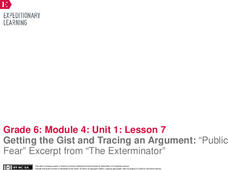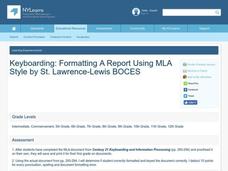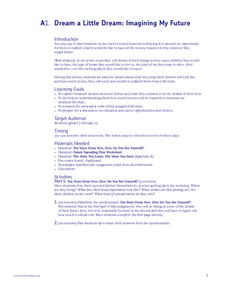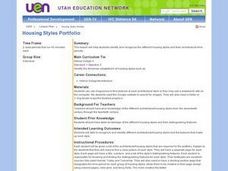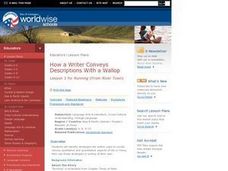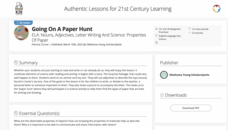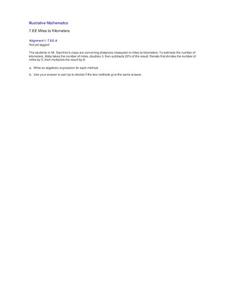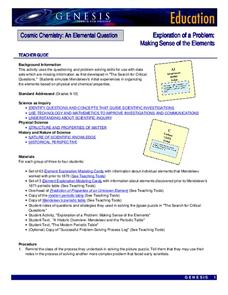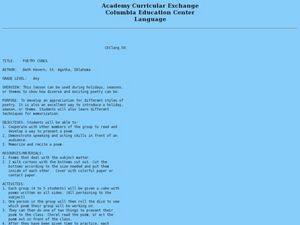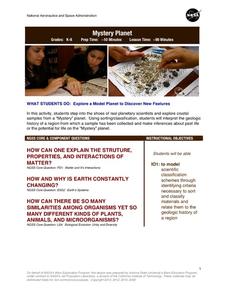EngageNY
Getting the Gist and Tracing an Argument: “Public Fear” Excerpt from “The Exterminator”
Only fear fear itself. Scholars read Public Fear from The Exterminator. Triads work together to annotate and determine the gist of the text. They then complete a Tracing an Argument graphic organizer to identify arguments, claims,...
American Statistical Association
Bubble Trouble!
Which fluids make the best bubbles? Pupils experiment with multiple fluids to determine which allows for the largest bubbles before popping. They gather data, analyze it in multiple ways, and answer analysis questions proving they...
Space Awareness
What is Time?
Does it ever seem like time is slipping through your fingers? Model the passing of time with an hourglass activity in which individuals determine whether hourglasses are the most efficient way to measure time.
Science 4 Inquiry
Battle of the Waves
Which travels faster, light or sound? Scholars work in groups to simulate the ability for waves to travel through solids, liquids, gases, and through a vacuum. Then, they learn about the properties of a mystery wave and must determine...
Curated OER
Keyboarding: Formatting A Report Using MLA Style
Introduce your class to the MLA style of formatting. In addition to studying the formatting, learners improve language skills and review word processor features. They use the Interwrite SchoolPad for the first time to assist in proofing...
EngageNY
TASC Transition Curriculum: Workshop 12
How can opinions slant facts? Workshop participants learn how to examine primary and secondary sources and identify the author's point of view. They also examine how visual art impacts the meaning and rhetoric of sources. Full of...
EngageNY
Studying Conflicting Information: Varying Perspectives on the Pearl Harbor Attack, Part 1
Scholars read President Roosevelt's Day of Infamy speech and analyze the speech's words using close reading guides. Readers determine Roosevelt's point of view after reading the speech and filling in the guides.
EngageNY
Forming a Research-Based Claim: Stakeholder Chart on Better Industrial Water Management
It's time to stake a claim! Working with partners, scholars create stakeholder charts for better industrial management of water. As they complete the chart, pupils consider an option for managing water more sustainably, identify...
EngageNY
Carl Hiaasen’s Perspective of Florida: Part 3
What is your perspective? Scholars read Florida: A Paradise of Scandals Excerpt 2 and look for unfamiliar words. They determine author perspective by completing Gathering Evidence of Hiaasen’s
Perspective: Part three graphic organizer...
Curated OER
Dream a Little Dream: My Future
What will the future hold? How can I make my dreams come true? Since learners don't have fairy god mothers, they'll need to develop strong goal-oriented plans. They concoct ideas of their dream life, determine the type of income needed...
Curated OER
The Gene Scene
Sixth-grade scientists gain understanding of how genetic traits manifest with simple experiments, such as determining whether their tongues are roller or non-roller, taster or non-taster. Extensions include performing tests at home with...
Poetry Class
Eccentricity and Sound
What do Lady Gaga and Dame Edith Sitwell have in common? As they examine Sitwell's poetry, class members learn that the similarities are far more than their unique appearance.
Curated OER
Housing Styles Portfolio
Learners are introduced to the various types of housing styles. In groups, they use photographs of the styles to determine their architectural time periods. Using the internet or magazines, they find their own images and create a...
Curated OER
How a Writer Conveys Descriptions With a Wallop
Students identify strategies the author used to vividly convey qualitative and quantitative aspects of life in China, then use those strategies in writing of their own. They examine the author's writing style and techniques to learn some...
K20 LEARN
Going on a Paper Hunt: Nouns, Adjectives, Letter Writing and Science - Properties of Paper
A lesson introduces scholars to nouns and adjectives. After listening to a short story and practicing creating adjectives with a card sort, pupils go on a paper hunt to locate different types of paper, complete a chart with adjectives,...
Curated OER
The Rigors of Learning a New Language
Students consider the immensity of the the task the author undertook to learn Chinese. They examine the rigors involved in learning another language-particularly one as notoriously difficult as Chinese and compare aspects of Chinese...
Illustrative Mathematics
Miles to Kilometers
Can your mathematicians come up with an easy way to convert miles to kilometers? Start by asking learners to write an algebraic expression for each of the descriptions given. Once they determine that they are both the same, ask...
Chymist
Visualizing pH
Why are acids and bases important in our daily lives? Lead the class in answering this question, among others, as they experiment with pH paper and classify where various substances belong on the pH scale. They also taste common acids...
NASA
Exploration of a Problem: Making Sense of the Elements
When given too much data to simply memorize, it helps to sort it into manageable groups. The second lesson in the six-part series of Cosmic Chemistry challenges groups of pupils to take a large amount of data and figure out how to best...
Curated OER
Poetry Cubes
Reading aloud can be scary, but it's an important way to build oral fluency. Break the class into groups of four or five learners. Each learner will roll a cube to determine which poem they read aloud to their small group. Feel free to...
Curated OER
Pop Tops
Get your class primed for a comparative analysis lesson with this activity. They compare and contrast their music preferences to those of their classmates. After reading an article, they identify current trends in popular music, analyze...
New York State Education Department
TASC Transition Curriculum: Workshop 3
Teachers turning into students? It's not Freaky Friday! It's a thoughtful workshop that teaches participants how to plan professional development for staff. Third in a 15-part series, the workshop provides a platform for the other...
NASA
Mystery Planet
What can one learn about a planet based on a small surface sample? Learners will explore artifacts from a mystery planet and see what they can determine about the planet based on the evidence in front of them.
Province of Manitoba
Leadership Skills
Pupils engage in a think-pair-share to identify the characteristics of effective leadership. Scholars also complete questionnaires to determine their personal leadership styles.


